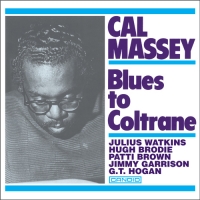Description :
In examining Massey’s life and music, three names continually emerge. One is that of the great tenor saxophonist John Coltrane, whom Massey met as a teenager in Philadelphia and who remained a close friend until his death in 1967. ... [Show more]
Description:
In examining Massey’s life and music, three names continually emerge. One is that of the great tenor saxophonist John Coltrane, whom Massey met as a teenager in Philadelphia and who remained a close friend until his death in 1967. After Coltrane’s passing, Massey frequently joined forces with saxophonist, poet, and playwright Archie Shepp; though Shepp was about ten years Massey’s junior, the two developed a bond that remained close for the rest of the older man’s life. Massey, Coltrane, and Shepp are all linked by the prolific but obscure composer and arranger Romulus Franceschini, who lent his hand to many important jazz projects, such as Coltrane’s Africa/Brass and Shepp’s Attica Blues. He maintained with Massey a symbiotic relationship not unlike that of Billy Strayhorn and Duke Ellington. On the whole, as in the case of Ellington and Strayhorn, it was difficult to tell where one musician’s contribution ended and the other’s began.
Massey also shared a radical political stance with Shepp and Franceschini. It is impossible to separate his work from the militant arm of the Civil Rights Movement that took shape in the 1960s and 1970s. As Fred Ho has noted, “Titles such as ‘’Hey Goddamn It’’, ‘’Things Have Got to Change’’, ‘’The Damned Don’t Cry’’, and ‘’The Cry of My People’’ spoke directly to a consciousness of oppression and a politics of liberation. In fact, the Black Panthers were a driving force behind Massey’s creation (with Franceschini) of The Black Liberation Movement Suite. At the First Pan-African Arts Festival in Algiers in 1969 Massey met exiled Panthers leader Eldridge Cleaver who commissioned the Suite primarily as a fundraising venture. The work would be performed at Black Panther benefits three times during Massey’s lifetime.
Massey paid heavy dues for his adventurous music and ideology, as did many of his contemporaries. According to his widow, an altercation with an executive at Blue Note Records resulted in his being blacklisted or, as Fred Ho put it,’’whitelist-ed’’ from major recording companies. As a result, only one album was recorded under his name, Blues to Coltrane (Candid, recorded 1961, released 1987).
Massey died from a heart attack at the age of 44 in New York City, New York. October 25, 1972.
[Hide]







